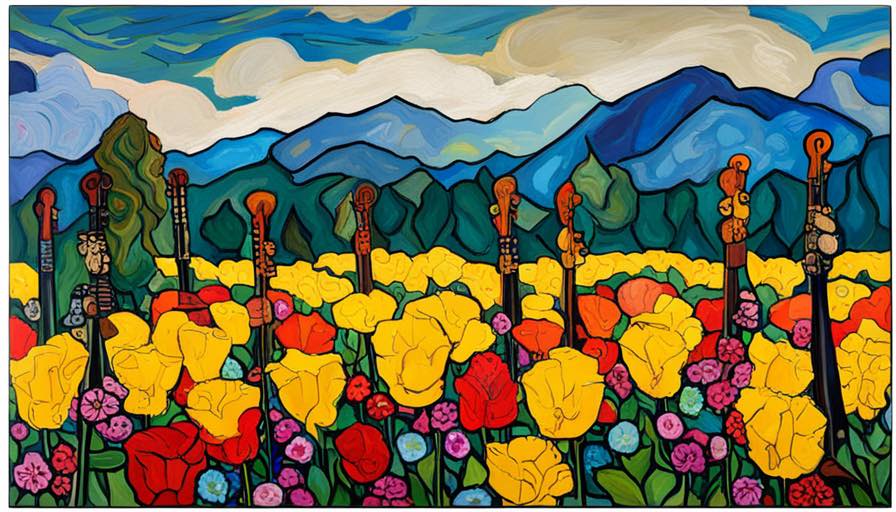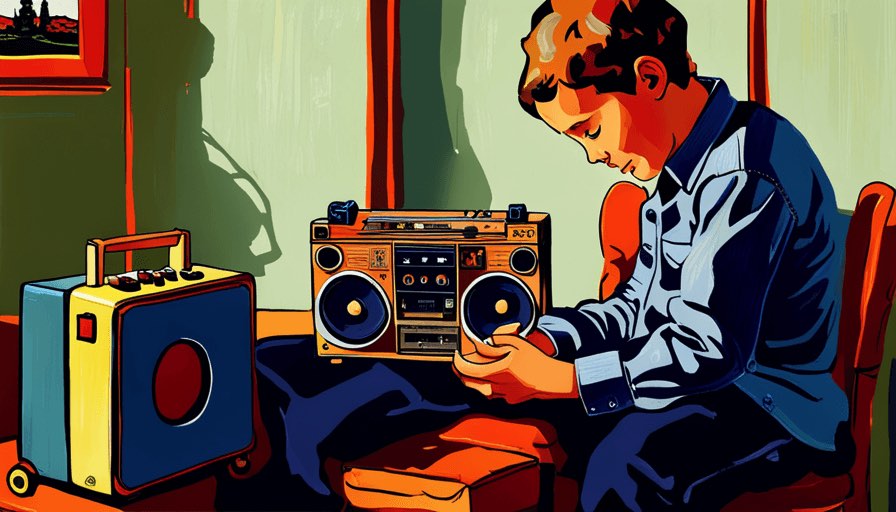Andrew Bird is an American multi-instrumentalist who got his start as a collaborator with the Squirrel Nut Zippers in the late 1990’s. His music has ranged from solo performance using a looper to layer violin sounds to deep orchestral collaborations. Can we say for certain these are the top 10 best Andrew Bird songs? No, that’d be absurd. But we can confidently say these are some of the stand out tunes that continue to echo through his canon of work.
As a superfan of Bird’s, this detective has seen him in concert at least ten times over the years, ranging all the way back to his time with the Squirrel Nut Zippers, through his early solo tour days up to present. Here are my ten favorite Andrew Bird songs, and the meanings and interpretations behind them.
Buckle up for some brief jaunts into history, brain chemistry, philosophers like Camus, poets like Auden, Biblical references, and of course, a double-dive into Greek Mythology. We’ll discuss his wife’s cancer diagnosis, and how a Thai exchange student’s comment generated the groundwork for “Pulaski at Night.”
Table of contents
1. Why?
Early and full of awkward pauses, this song is about a relationship’s power dynamics.
Released on The Swimming Hour, this is a signature “early Bird” song- slow, sultry, playful and downright funny in some ways. The song starts out with a question:
Why? Why’d you do that?
You shouldn’t have done that.
If I told you once, I told you three times that you’ll
Get your punishment when you show me your crime.
The refrain that comes back again and again throughout the song is “Damn you for being so easygoing.” This song is the story of someone who feels like they should be annoyed with their partner- that they’re maybe even entitled to be annoyed with their partner, based on what’s happened.
But ultimately, their partner is too cool to be bothered by trivialities. Bird’s violin here alternates between sounding like a nagging partner, with arpeggiated nips and repeated sounds, and then like a whiny partner. The little interruptions of silence are a sort of stand-in for the easygoing partner, who doesn’t add any noise to the skirmish, but still plays their part.
2. ACTION/ADVENTURE
The entertainment industry makes Bird wonder: who is wasting whose time?
In Weather Systems, a signature style is starting to emerge for Bird. He mixes more rhythmic tracks (like Lull) with slower, more meandering music like the title track. Gorgeous songs like Don’t Be Scared, while overtly pop-chart friendly, still bring in lyrical elements that remain a bit too strange to be a mainstream hit. Action/Adventure is the real star here.
In Action/Adventure Bird is questioning the norms of the entertainment industry, and self-consciously addressing the ways that we create content for consumption, rather than art for its own sake. The idea that we’re “playing for a prime-time dream” – and the question of whose time is really being wasted by putting things out there that are meaningless- is at the core of the song.
“If you think I’m wasting your time again… Oh you’re wasting mine” is a critique of the entertainment industry as it existed in 2003. You can almost picture a music industry executive trying to package a talented, handsome young Andrew Bird up for a more mainstream presence, asking him, “I wonder could ya pep it up a bit?”
It’s also important to know that this album was Bird’s first since disbanding his Bowl of Fire group, so based on the timing, it seems like the story of one small band’s collapse in the face of unrealistic industry pressures. But Action/Adventure turns out to have been an eerily accurate forecast about the course of the entertainment industry at large.
3. SOVAY
A meandering, challenging song to pin down, Bird is challenging Wagnerian power structures and using daydreaming as a means of escape.
Of all Andrew Bird’s catalogs, this one earns the spot for “toughest meaning to pin down.” First, we have to accept the idea that if a songwriter intentionally chooses a word and a refrain with an unclear meaning, maybe they didn’t want us to pin them down to begin with.
Now: Sovay is an old English song in which a young woman disguises herself to rob her suitor. This robbery is meant as a test of his devotion, because he refuses to give up a ring that she gave him to Sovay, the disguised robber.
She gives him back his things and tells him that if he’d given up the ring, she’d have killed him. Romantic, eh?
Anyway, much as we can trust that Bird reads Galway Kinnell (he’s taken two of Kinnell’s poems and adapted them to music, including First Song and Wait) we can expect that Bird is a well-read guy and aware of these types of songs.
The song starts out with the idea that Bird was “getting ready to be a threat” and “Getting set for my accidental suicide/ The kind where no one dies/ No one looks too surprised.”He’s starting out in a low place here, and recognizing that he’s been “riding on the para-success” (the not-quite, or almost success) of his songwriting, which we can interpret to be the “heavy-handed metaphor” he’s referencing. A word then “washed to shore,” and appears to wash over him musically- which we hear again in the form of the refrain- is Sovay. Sovay seems to distract him from negative his self-reflection and pull him into a bigger, more imaginative space.
The “Don Quixotes” and the board of trustees with their B-17s are stand-ins for the different versions of brutalities of the powerful people in our society. He says they’re “playing ride of the Valkyries,” which is a segment of a Wagnerian opera- if you listen to it, you’ll likely recognize it. It’s been used in a number of films.
The critique here is that people in board rooms are “playing” at war, using old war game templates, but at a real human cost that the folks in the board room with “violent proclivities” will never see first-hand. Then once again, the word Sovay washes over him, and he is sort of swept away from these concerns. This song is about the rhythm of feeling alternately despondent and angry about the state of the world, then feeling the beauty of the world and becoming aware all at once of the many possibilities that wash over us.
4. PLASTICITIES
The thesis: We’re fighting for the rights to our own attention and responsiveness.
Armchair Apocrypha is this Song Detective’s favorite album. How could we pick just one song from this album stacked with absolute goodness from start to finish?
First, here’s a quick definition of neuroplasticity from the National Institutes of Health, which is what he’s referring to throughout the song:
What is neuroplasticity in simple terms?
It is defined as the ability of the nervous system to change its activity in response to intrinsic or extrinsic stimuli by reorganizing its structure, functions, or connections after injuries, such as a stroke or traumatic brain injury (TBI)
In this song, Bird is lamenting the changing culture’s negative effect on our brain power. The “precious territory” you’re fighting for is your own brain’s responsiveness.
We see that we’re each in our “own personal Waterloo.” Waterloo was a battle that ended the wars that erupted in Europe. Used colloquially, Waterloo is a way of saying there’s a final setback, a final battle, a defining moment at the end of something.
The fight we’re in together, according to this song, is for the right to gather and celebrate art, and to live in real and valuable community with one another– in other words, “Your music halls/ And dying cities.”
Meanwhile, others are attacking our “neural walls/ And plasticities.” This is a song about self and community preservation in the face of the powers that want us to be a “whale in a cubicle.”
5. SOUVERIAN
Musically exceptional and a bit elusive- this song is meant as an invitation.
This one, like Sovay, picks a beautiful word and runs with it. The piano intro is crisp and spring-like, setting the tone of the whole piece. As the song goes on, this beautiful springy feeling starts to feel a bit haunted by a canyon-like echo.
As we see in the unfolding of the song, Souverian is a play on “So very young.” It could also be seen as a play on the word Sovereign, as it is only one swapped letter from the French translation of the word.
This song is unflinchingly and uniquely representative of Andrew Bird’s style. There are tensions with time “Under the elders/ the older get younger/ the younger get over/ over the elders/ and under the elders/ pretend that you’re older now.”
The images throughout are of someone being touched and scarred by nature- “Wild parsnips they still scar my lungs/ While thistles will burn my feet.” But you’re invited to join him in this spring frolicking, knowing that “you’ll never fear anymore/ If you join our chorus.” He also mentions a ” fatal shore,” a theme that will pop up again for him in 2012’s Break It Yourself.
The musical scope of this track is more of a sweeping orchestral piece that starts with the bright piano introduction mentioned at the beginning but ends in a dark, escalating rhythmic piece that swells and then slows down dramatically as he explores the relationship of human time to tree time. “Under the elders” is a reference to elder trees, as we see his mention of “bending the branches down.”
6. ORPHEO/ORPHEO LOOKS BACK
Twice released in 2012, this is a take on a classic Greek myth about trust and patience.
It’s hard to feel like this one isn’t a favorite of Bird’s, since he released it twice.
It’s a favorite of mine as well. The first release of this song was on Break It Yourself as Orpheo Looks Back. Later that year, he redid the song for Hands of Glory (October 30, 2012) as Orpheo. The Break It Yourself version is upbeat with little trills and musical breakdowns that make you feel like you’re popping into some sort of late medieval Irish pub. The Hands of Glory version is slow and somber, aligning with the sounds of that album.
This song is Bird’s take on a classic Greek myth of Orpheus and Eurydice. Orpheus’ beloved wife, Eurydice was killed by a snakebite. Orpheus, a hero whose beautiful music had helped to save the Argonauts, was destroyed by the grief over his wife’s death. He negotiated with Hades, lord of the underworld, that he could go down to the underworld and bring Eurydice back to enjoy the light of day. Orpheus had to “cross the muddy river where love turns to fear,” meaning the River Styx of the underworld. He had to visit the darkest, scariest places to be reunited with his love.
Hades agreed to let Orpheus go to the underworld and bring Eurydice to the light of day, but only on one condition: that Orpheus had to trust that Euridyce was following behind him. Orpheus, traveling ahead of his wife as agreed, was excited to hear his wife’s footsteps behind him as he approached the light of day. He wanted so badly to turn around, as Bird phrased it: “With eyes that keep on strainin’/ as if to see what lies behind them.”
Orpheus turned back a moment too soon. Euridyce had not yet emerged from the underworld as Orpheus turned to embrace her. At that moment, she vanished back into the underworld, never to return to him again. This is why, Bird writes, “they say you don’t look/ ‘Cause it’ll disappear.”
The version on Hands of Glory is a slower, more mournful version. The violin solo sounds like someone crying and mourning. After Orpheus failed to be reunited with Eurydice, he went mad. He wandered alone, uninterested in anything or anyone, and was comforted only by laying on a rock and listening to the wind. If you listen to the end of the Orpheo version on Hands of Glory, you can hear Bird emulating a rolling wind as he sings a long “oooo” in tandem with the violin.
Orpheus no longer played joyful or entertaining music. A group of women angry with his disinterest in life killed him and threw his lyre in the river. After he died, he was reunited with Eurydice once again. Ultimately, Orpheus was driven mad, like the song suggests. But when he died, the madness passed and he was reunited with his love.
The myth of Orpheus and Eurydice is a myth about trust and patience. He had to trust that she truly was right behind him, and he had to be patient enough to wait for her. This detective thinks that Bird’s interpretation tells us that yes, there will be things in love that drive us mad. But patience and trust as the things that will carry us through. Here’s Orpheo from Hands of Glory, which you can compare to Orpheo Looks Back, the more rousing version. The lyrics are identical.
7. PULASKI AT NIGHT
How a Thai exchange student prompted one of Bird’s best songs.
Andrew Bird is originally from the Chicago suburbs, having grown up in Lake Forest, Illinois. Pulaski Street in Chicago is on the West Side, and not known as a particularly pretty spot.
Bird once explained to a crowd in New York City that he once met a Thai exchange student who said he wanted to see “Pulaski at night,” and how the phrase just “stuck in his head.” Bird toyed with the idea for over a decade before writing the song Pulaski at Night.
If you put yourself in the shoes of a traveler in a faraway place, thinking of that Thai exchange student who first ignited Bird’s imagination when he uttered the words “Pulaski at night,” you can see that the meaning of this song is wanting to tell people what you’ve seen, what you’ve experienced while away, but finding that the words fall short. As Bird laments, “I write you a story/ But it loses its thread.”
The picture the speaker tries to paint somehow “never looks right.” The speaker finds themselves blocking out shadows and getting the light all wrong. This is a metaphor for the ways that we try to share our experiences, but can’t always portray them in a way that feels as true or as real as how we experienced them.
In the end, the story, the picture, and the postcard will fall short. But what we’ll have that’s real is what we experienced. There are pieces of our experience that can’t truly be captured and explained. It’s how we end up with a cup that’s “half empty, half full” – we have the pieces of our experience that are full and belong to us only (half full), and we have the pieces of our experience that we try to share, knowing that they’ll be incomplete in some way (half empty).
8. PUMA
After his cat-like wife’s bout with cancer, Bird started writing more directly.
Andrew Bird’s wife, Katherine Tsina, was diagnosed with thyroid cancer shortly after giving birth to their son. This was a harrowing time for them as shows up in the song Puma. During two surgeries and radiation treatment, Bird had to keep their young son away from her.
In an NPR interview, Bird said that the song Puma is more literal than most others he’d written before it. About his wife, he said, “She had to take a radioactive pill and hole up in our studio apartment in New York alone.” The song is about their forced separation during that time, and how she handled the whole ordeal with humor and grace.
When you think of something strong and graceful, don’t you just think of the big cats? Well apparently, thinking she’s half-cat was a long-running joke between Bird and his wife. According to an LA Times interview, one day, while walking through Central Park discussing her diagnosis, she commented to him, “I’m afraid they’re going to tell me that I’m a girl and not a puma.” So the basis for the song, as unusual as it seems, was actually quite literal. “She was radioactive for seven days/ And how I wanted to be holding her anyway/ But the doctors they told me to stay away.”
9. SISYPHUS
With another myth, Bird is pulling from philosophy and making peace with absurdity.
Sisyphus, like Orpheo, is a retelling of a classic myth. Sisyphus was a trickster King who cheated death, displeasing the gods. For doing so, he received an eternal punishment from Zeus, in which he had to roll a boulder up a hill every day just to have his work undone when the night came.
Because every night his work was scrapped, the work he did daily was meaningless. (That’s why you might sometimes hear people describe an interminable or pointless task as Sisyphean.) Albert Camus, the philosopher, famously wrote about Sisyphus, explaining that the moral of the story is that life only has the level of meaning we give it. And there’s an inherent absurdity to our attachment to our accomplishments on Earth, since we know full well that we can’t take any of our accomplishments with us when we go.
As the song opens, Bird is wondering about the way Sisyphus starts his day. “Did he raise both first and say, “To hell with this,” and just let the rock roll?” One of the questions raised by many people about Sisyphus over time was, why he kept rolling the rock again. The answer, according to the myth, was that he really believed that eventually, he would get the rock to the top and his punishment would end.
Bird says he’d “rather fail like a mortal than flail like a god on a lightning rod/ History forgets the moderates.” I detect this to be much like Camus’ idea that there’s an inherent absurdity to our choices because we lose either way- you can do your best with your one mortal life, or you can turn yourself into a lightning rod for pain and punishment.
Either way, the same thing happens. Bird seems to be asking Sisyphus- what happens if you just let the rock go? What happens if we let go of these outer forms of accomplishment and the meaning imposed by other people about how we spend our time, and we just let the forces of the world like gravity take over. How would our lives unfold if we made peace with the absurdity of it all?
10. BLOODLESS
A direct turn toward the 2016 election, echoing W.H. Auden’s poetry and the Bible.
As we know, Bird is a student of history and philosophy. This song is overtly political and meant to compare the 2016 election political climate to the Spanish Civil War. Bird commented to NPR that the song is about people “reaping power and wealth from divisiveness.” The political commentary here is crystal clear- Bird sees that fascists were gaining power against a disorganized political left.
The eerie poetry of this song is encompassed in one word— the war is “Bloodless for now.” This is a call to action, to help people recognize what’s happening and become engaged in building a better society while this quiet, emerging civil war is still Bloodless.
Bird references his allegiance to his family subtly here- he says, “I’m putting my weight behind the dancer.” His wife, Katherine Tsina, is a classically trained dancer.
There are two different warnings in this song echo the philosopher Bertrand Russell: “I know it’s hard to be an optimist/ When you trust least the ones who claim to have the answers.” And also, “The best lack all conviction/ And the worst keep sharpening their claws.” Russell famously said, “The whole problem with the world is that fools and fanatics are always so certain of themselves, but wiser people are so full of doubts.”
The line about poets exploding like bombs is an overt reference to Auden’s poem, “Spain,” published in 1937. Auden was writing about Franco’s fascist rebellion, and wrote, “To-morrow for the young the poets exploding like bombs.”
The phrase about the well-known psalm is also a direct paraphrase from the Bible, Psalm 37:1-9:
Don’t worry about the wicked or envy those who do wrong.
He will make your innocence radiate like the dawn, and the justice of your cause will shine like the noonday sun.
Bird’s lyrical version of this:
Don’t you worry ‘bout the wicked
Don’t you envy those who do wrong
And your innocence will be like the dawn
While the justice of your cause will shine like the noonday sun.
Ultimately, this song is a critique of people who are “profiting from your worry,” and a cautionary tale that while it’s easy to look at the world and feel confused and full of doubts, we can’t let that “lack [of] all conviction” blind us to the increasing power of those, “the worst,” who “keep sharpening their claws.”
Bloodless is really a companion song to Manifest, which asks us not to look away from the current state of affairs, and instead, to figure out where and how we as individuals plug into these damaging systems, so that we can figure out how to change them.




